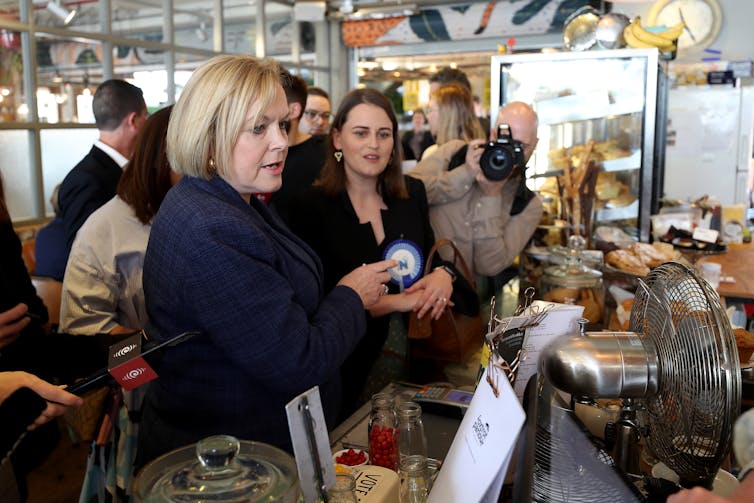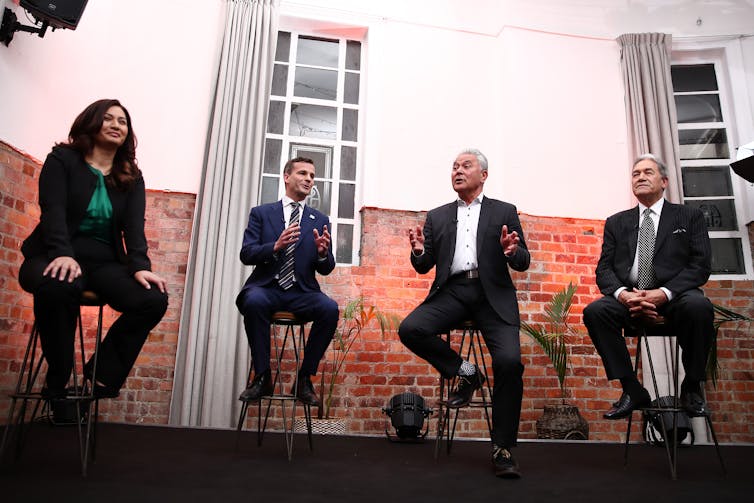NZ election 2020: 5 experts on the final debate and the campaign's winners and losers ahead of the big decision
- Written by Richard Shaw, Professor of Politics, Massey University
After a long and COVID-delayed campaign, New Zealand’s general election is just a day away. For the fourth and final time, Labour leader Jacinda Ardern and National Party leader Judith Collins met last night for a televised debate. With a record number of advance votes already cast, however, there is a sense of their respective fates being mostly sealed.
Furthermore, last night’s debate was prefaced by a final 1 News Colmar Brunton poll showing little change in the major parties’ fortunes, but a lift for Labour’s likely coalition partner the Greens.
Here, our five experts respond to the debate and offer their concluding thoughts on the campaign, the performance of the leaders and parties, and the implications for New Zealand’s 53rd parliament.
A generational shift
Richard Shaw, Professor of Politics, Massey University
Those noises off you heard during the final leaders’ debate were the sounds of the smaller parties jostling: some for influence, some for relevance and some for survival. For all the speculation that Labour may be able to govern alone, the 15 parties contesting the election not called Labour or National matter a great deal to the eventual outcome.
For one thing, even if Jacinda Ardern goes to bed on Saturday night in command of a parliamentary majority (and the latest poll suggests that possibility may be slipping away), she may well try to cobble together an arrangement with the Greens and the Māori Party — assuming the first makes it to 5%, which is looking increasingly likely, and the second takes at least one of the Māori seats.
She will have an eye on constructing a coalition that shuts the centre-right out of power for a generation.
National have a small party problem of a different sort — the one where the party you have kept on life support for years suddenly flicks the switch and starts hoovering up your vote. ACT’s caucus is presently 2.3% the size of National’s — by Sunday that could balloon closer to 25%. National is in danger of becoming a smallish party itself. If that occurs the party will be looking at an extended period of rebuilding, which may include replacing Collins as leader.
You could see some of these things in play in last night’s debate. Ardern largely refused to insult anyone or rule anything out in the post-election washup, other than promising she would not continue as leader if she lost.
Collins played to her base and angled to bring back people who have decamped to New Zealand First or the New Conservatives. Ardern playing the long game, Collins doing her best to stave off an electoral towelling.
And all the while those noises off continued, particularly from a New Zealand First beginning to show signs of a rather late resurgence.
A campaign of missed opportunities
Bronwyn Hayward, Professor of Politics, University of Canterbury
Disasters such as a global pandemic present opportunities for radical policy shifts, but that hasn’t happen in this election campaign. Both major parties relied on the conventional idea of economic growth as the driver of future recovery: investing in growth through training and employment (Labour) or cutting taxes to boost consumer spending (National).
With the focus on COVID risks, there has been little opportunity for debate about our preparedness for the other, slower moving disasters facing New Zealand. Rising house prices, small business priorities and challenges facing tourism have featured often, but any real discussion of structural reform (a wealth or capital gains tax, universal basic income or services) has been shut down firmly by both major parties.
Read more: NZ election 2020: Jacinda Ardern promised transformation — instead, the times transformed her
When this year’s 18-year-old first-time voters turn 58 their climate will be virtually unrecognisable from the one we know now. Yet a major Environment Ministry climate report released on the day went unremarked in the final debate, and there was no discussion of the wider burdens that will confront first time voters their whole lives: growing inequality, serious urban water shortages, wildfires, drought, flooding and coastal inundation.
Nonetheless, there were winners in this election campaign: the voters who seized the opportunity to enrol right up to election day, turning out to advance vote in their thousands, many for the first time, including Māori, young people, the homeless and prisoners serving under-three-year sentences (who regained the right they’d lost in a previous law change).
Political debate will only really change when their voices are heard.
 National Party leader Judith Collins orders coffee during a campaign walk along Ponsonby Road in central Auckland.
GettyImages
National Party leader Judith Collins orders coffee during a campaign walk along Ponsonby Road in central Auckland.
GettyImages
Landslide to Labour
Rawiri Taonui, Chair Te Rūnanga Māori, Ako Aotearoa (Massey University)
Jacinda Ardern lost the first two leaders debates with over-philosophising 10-second soundbites. She won the last two on substance, principle and her word. National leader Judith Collins won the first two because she had better one-liners. She lost the third because she yelled, and the fourth because she called Ardern a liar.
With ructions over Collins making “policy on the hoof” and a lack of discipline in the ranks, all has clearly not been well with National. So, some predictions:
With two referendums and an electorate seeking reassurance, the highest voter turnout since 1999 and an increased youth vote.
A massive win to Labour, 58 to 62 seats and a record 15 Māori MPs. The Greens to return three Māori MPs. A post-election question — will Labour promote more Māori into senior cabinet roles?
National in the low 30s or high 20s, meaning a drop from eight to four Māori MPs. Act returns three Māori MPs. With more Māori on the left and fewer on the right, expect an increase in racist rhetoric on kaupapa (principle or policy) such as Ihumātao, Whānau Ora and Māori representation.
Having completed a constructive rebuild after the debacle of 2017 and despite a racist Māori electoral option that prevents former supporters returning to the Māori roll until 2024, the Māori Party has been impressive. They may take at least one Māori electorate. If not, they have a platform for 2023.
New Zealand First leader Winston Peters to retire, receive a knighthood, and open a company conducting polls in future elections. As he says, accuracy is everything.
 Minor party leaders at a pre-election debate: Green Party co-leader Marama Davidson, ACT leader David Seymour, Māori Party co-leader John Tamihere and New Zealand First leader Winston Peters.
GettyImages
Minor party leaders at a pre-election debate: Green Party co-leader Marama Davidson, ACT leader David Seymour, Māori Party co-leader John Tamihere and New Zealand First leader Winston Peters.
GettyImages
Are televised debates still relevant?
Jennifer Curtin, Professor of Politics and Policy, University of Auckland
In 1960, the first live debate between the two major candidates for the presidency of the United States was aired on television. There were four debates, over 100 million people watched at least one, and they led to a four point increase in turnout. Political commentator Walter Lippman labelled them a “bold innovation which […] could not now be abandoned.”
Fast forward to New Zealand 2020, where we have witnessed four televised debates between Ardern and Collins, and several between the minor parties. While over one million viewers tuned into the first debate for at least one minute, do they still represent the “key democratic moment” that a commentator once claimed? Have we learnt anything new about what our next government will do?
Maybe not. The format doesn’t allow for in-depth discussion of policies, but perhaps we find out how much our leaders care about what they are selling. We now know that Collins has a capacity for quick-witted retorts, is unafraid to interject relentlessly and to swing easily between positivity and attack, although last night’s debate was calmer than previous ones. And we were reminded that while Ardern might prefer being relentlessly positive, she can be aggressive when pushed.
But maybe the value of these debates is in the way they magnify the political personalities of our leaders. We have seen how Ardern and Collins respond under pressure in the spotlight, how they manage their emotions and their energy levels. After this very long campaign, we know a bit more about their character, their qualities and flaws. Perhaps that is a good enough reason for televised debates to continue.
An election against the odds
Grant Duncan, Associate Professor for the School of People, Environment and Planning, Massey University
An election in the midst of a sharp economic recession may sound ominous for a sitting government. Holding a free and fair election with good turnout during a global pandemic may sound impossible. But New Zealand has confounded such concerns.
Advance voting has been higher than ever, promising a good turnout. The governing Labour Party and Prime Minister Jacinda Ardern are leading the opinion polls, despite the economic pain. So, Ardern is likely to get a second term in office.
Labour’s election results have risen from 25% in 2014, to 37% in 2017 after Ardern took the helm — and now their polling points towards the mid-forties. This is quite a political feat, especially given (or is it due to?) the crises confronted this year.
Read more: NZ election 2020: as the ultimate political survivor, Judith Collins prepares for her ultimate test
The election campaign has been open and robust — with relatively little peddling of misinformation and conspiracy theories. In the final week, Collins was in attack mode, even alleging Ardern had lied about border staff testing. Yet the last debate ended on a note of mutual appreciation, with Ardern calling for our politics not to become too polarised.
If anyone has cause to complain, it’s the smaller parties who struggle to be heard above the Labour versus National match.
For all that, in my eyes, the Electoral Commission is the winner this time. New Zealanders are enjoying a safe and fair democratic vote during an extraordinary period. Kiwis may shrug this off or take it for granted, but democracies around the world should look and learn.
Authors: Richard Shaw, Professor of Politics, Massey University




